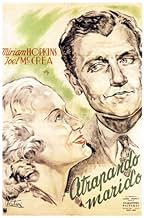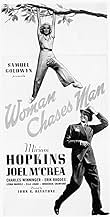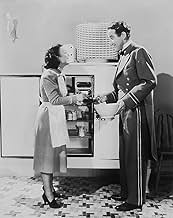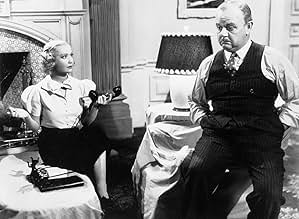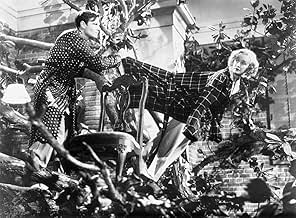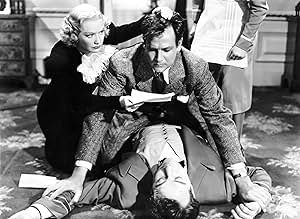Ajouter une intrigue dans votre langueFormer millionaire B.J. Nolan is useless with money, having lost most of his fortune on crazy schemes. His son, Kenneth, has the opposite problem thanks to good sense and a large inheritance... Tout lireFormer millionaire B.J. Nolan is useless with money, having lost most of his fortune on crazy schemes. His son, Kenneth, has the opposite problem thanks to good sense and a large inheritance bequeathed by his mother. In order to raise the cash for a housing project, B.J. enlists ... Tout lireFormer millionaire B.J. Nolan is useless with money, having lost most of his fortune on crazy schemes. His son, Kenneth, has the opposite problem thanks to good sense and a large inheritance bequeathed by his mother. In order to raise the cash for a housing project, B.J. enlists the help of young architect Virginia Travis to con the money out of Kenneth. At the same t... Tout lire
- Réalisation
- Scénario
- Casting principal
- Récompenses
- 2 victoires au total
- Process Server
- (non crédité)
- Process Server
- (non crédité)
- Policeman
- (non crédité)
- Taxi Driver
- (non crédité)
- Second Subway Man
- (non crédité)
- First Subway Man
- (non crédité)
- Elevator Operator
- (non crédité)
- Woman
- (non crédité)
- Doctor
- (non crédité)
- Process Server
- (non crédité)
Avis à la une
Hopkins, who suffered no fools and hurt her own career by it, loved working with McCrea and they made a quick series of five films together 1934-1937, all fairly successful at the box office and all great movies well worth viewing, with this one being the last. McCrea was moving into the greatest period of his career, 1937-1946, a time when nearly all his films were big hits. Late in life he credited Ginger Rogers and Barbara Stanwyck as the greatest actresses he worked with in his career, but he also spoke very highly of Hopkins and credited her with helping his career besides being a great screen partner. His wife Frances Dee was very popular with other actresses and the McCrea ranch was the locale for many script readings and scene preps, with Rogers, Stanwyck, Bette Davis and Hepburn being regular visitors.
In this movie, Hopkins is so caught up by the shenanigans in the scene in the tree that she briefly loses her polished acting voice and you can clearly hear her native Savannah, Georgia drawl. And no wonder - it's hilarious!
Where does it go wrong? I'm not quite as knocked out by Preston Sturges as the rest of the world because I think he's too prone to pointlessly noisy madcap chase scenes, and more often that not his endings suck a lot, but Preston Sturges' screwballs really work (apart from the chases and the endings) and this film doesn't. The difference, then, must be script. Sturges' scripts are superb, glittering things, that you just want to eat with a spoon, and Woman Chases Man is a fairly charming film with a lifeless script.
Fast talking Hopkins is an architect (c'mon, that's what it says) full of pep talk when she schemes her way into CHARLES WINNINGER's office to sell him on her wonderful housing designs. (How many times has Winninger played a daffy millionaire in '30s endless parade of screwball comedies???).
He admits the plans look great--but the hitch is he's no longer a millionaire having lost all his money on crazy schemes. But wait. He's got a son (JOEL McCREA), more sensible than him who's got lots of money. All it's going to take is for someone (like Miriam maybe?) to separate him from it so they can go ahead with her plans to make Hopkins and Winninger rich.
That's about it for starters. But it gets even sillier once Winninger takes her to his home (after she's fainted a couple of times because the poor thing hasn't eaten in 49 hours). And once ERIC RHODES, BRODERICK CRAWFORD and ELLA LOGAN enter the scene, it gets sillier and more improbable with each dubious remark.
Hopkins is photographed attractively and puts a lot of spirit into playing a ditsy architect, but it's obvious from the start that this is not going to go down as one of the best screwball comedies of the '30s--not by a long stretch.
Winninger seems to be doing a warm-up for his other millionaire role in HARD TO GET ('38), again involved with an architect (DICK POWELL) and the scatterbrained daughter (OLIVIA DE HAVILLAND) who wants to get revenge on Powell for his mistreatment of her. He spent a lot of time in the '30s and '40s playing daffy millionaires who ruled over nutsy, filthy rich households.
Summing up: Not worth a peek.
** (out of 4)
Screwball comedy has a father (Charles Winninger) trying to get $100,000 from his son (Joel McCrea) but when the son refuses the father hires a young woman (Miriam Hopkins) to try and lure it from him. This is a rather strange film because it doesn't work as a comedy at all. In fact, I don't recall laughing a single time but the two leads keep things moving along and makes for a great couple but it's a shame the screenplay doesn't do them justice. McCrea comes off a tad bit too straight-forward but this works well against the more free-spirited Hopkins who is incredibly charming in her role. The supporting cast doesn't add too much and the ending is very predictable but fans of the two stars might be interested.
Le saviez-vous
- AnecdotesBroderick Crawford's feature-film debut, son of character actress Helen Broderick.
- GaffesWhen Virginia is sitting down and talking to B.J. about Nolan Heights; her hands are resting on the table. However on the next cut when she asks B.J. about Nolan Heights being safe, her hands are further up above the table. Additionally, in the next cuts, the orientation of her hands keeps changing,
- Citations
Virginia Travis: I know what you're thinking. That I'm a girl. Yes, Mr Nolan, but I've a man's courage, a man's vision, a man's attack.
B.J. Nolan: Well, don't attack me.
Virginia Travis: For seven years I've studied like a man, researched like a man. There's nothing feminine about my mind. Seven years ago I gave up a perfectly nice engagement with a charming, wealthy old man because I chose a practical career. I left him at the church to become an architect. Now, I'm ready and he's dead.
- ConnexionsReferenced in Autant en emporte le vent (1939)
- Bandes originalesTrees
(1922) (uncredited)
Music by Oscar Rasbach (1922)
Poem by Joyce Kilmer (1914)
Sung a cappella by Joel McCrea
Meilleurs choix
Détails
- Durée
- 1h 11min(71 min)
- Couleur
- Rapport de forme
- 1.37 : 1

